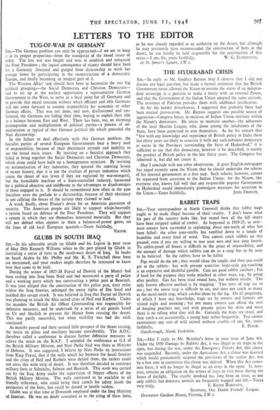THE HYDERABAD CRISIS
SIR,—In reply to Mr. Godfrey Barrass may I observe that I did not• discuss any legal question, but made a factual statement that the British Government never allowed the Nizam to assume the status of an indepen- dent sovereign in a position to make a treaty with an external Power, and that the Government of the Indian Union adopted the same attitude. The existence of Pakistan provides them with additional justification. As for the border disturbances, I suggested that probably there had been mutual provocation. Mr. Barrass suggests one possible source of aggression—Congress forces in enclaves of Indian Union territory within the Nizam's dominions. He omits to mention another—the adherents of the local Muslim League, who, alone among the inhabitants of the State, have been permitted to arm themselves. As for his remark that " few with any knowledge and experience of British policy in India these last thirty years are likely to associate it with any such nebulous democracy as exists in the Provinces surrounding the State of Hyderabad," it is sufficient to say that this democracy, however it be described, is mainly the product of British policy in the last thirty years. The Congress has inherited it, but did not create it.
May I conclude with one other observation. A great English newspaper has urged recently upon the Nizam that he should undertake the reform of his internal government as a first step. Such reform, however, cannot be separated from accession to the Indian Union: for the Nizam, like everyone else, knows full well that any responsible popular Government in Hyderabad would immediately promulgate measures for accession to






























 Previous page
Previous page